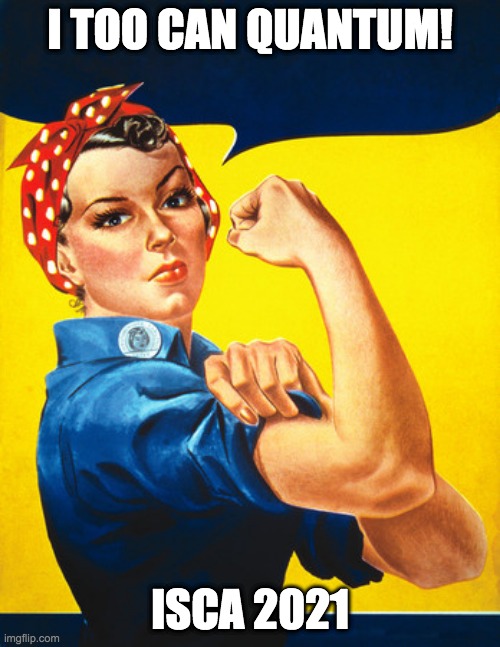I too can Quantum! (I2Q)
March 22, 2021
March 22, 2021
Workshop: I too can Quantum! (I2Q)
Held in conjunction with the 48th International Symposium on Computer Architecture
Virtual
Submissions Due: March 22, 2021
OVERVIEW
Current trends anticipate that the demand for a quantum workforce will greatly outweigh the supply in the near term. To fill this gap, talent has to be cultivated from the classical fields of science and engineering. Directly or indirectly, classical computing ideas are applicable in the quantum world, allowing for contributions from scientists and engineers who may not be fully trained in the fine details of quantum mechanics. Computer architects are especially critical to this endeavor as they are adept at bridging the information gap between different layers of the computing stack and are well poised to apply their cross-layer experiences from classical computing to the quantum domain.
While educating classical computing experts and novices in the deeper mathematics and physics of the quantum world is challenging, enabling them to think about quantum from the perspective of classical computing control for quantum computing is more conceivable. In this spirit, the I2Q workshop is focused on recognizing and mentoring innovative PhD students across a broad range of technical research areas, with a goal of contributing towards and furthering quantum research. I2Q enables graduate students with a solid classical foundation, a passion for quantum computing and preliminary ideas in a specific quantum domain to be mentored by quantum experts from academia, industry and national labs and support them in their quest towards achieving their research goals. Afterwards, these classically-trained students will confidently say, “I too can Quantum!”
MECHANICS
-
Students will submit a proposal on any innovative idea targeting quantum computing and are encouraged to seek ideas inspired from their own classical computer architecture expertise.
-
I2Q will carefully review submitted proposals based on their potential for quantum innovation and solidity in (classical) foundation and select the I2Q finalists.
-
The I2Q finalists will be mentored by quantum experts over a 5-6 week period prior to the ISCA workshop to facilitate the successful formulation of the proposed research.
-
The finalists will present their maturing research proposals at the I2Q workshop.
-
Further, we strongly encourage the continuation of these research partnerships beyond the workshop scope and timeline.
SUBMISSIONS
TOPICS
Submissions are encouraged in quantum computing directions inspired by (but not limited to) computer architecture ideas such as:
Compilation, Scheduling, Approximate Computing, Error Correction, Verification, Design Automation, Simulation, Parallelism, Memory Management, Edge Computing, Distributed Computing, Heterogeneous Co-processing, Security, Communication, Benchmarking, Ultra-low Power/Temperature Computing, Modularity, Microarchitecture, Integration vs Abstraction, ISA.
GUIDELINES
The goal of this workshop is to help students think about a nascent quantum problem/idea in an holistic manner and communicate those ideas to the wider quantum community so that we can provide valuable early-stage feedback and mentorship, hopefully leading to long-term collaborations.
Submissions are loosely expected to discuss:
-
Description of the quantum problem and its scope.
-
Preliminary idea for a solution and its potential classical inspiration.
-
Evidence of building towards a realistic implementation of the solution as well as evaluation methodology.
-
Discussion of related ideas and future goals to provide more breadth to the proposal.
-
A short note on student background and skills and why they are suited to this project.
SPECIFICS
-
Submissions must be PDF files, in 2-column, single-spaced, 10pt format.
-
Submissions must be at most 2 pages long, not including references.
-
Submissions will be single-blind.
-
Please provide author information in the submission.
-
Submissions can be individual or in teams, but all are expected to be in early stages of their quantum research pursuits.
-
Tentative Deadline: March 22, 2021, 11:59pm EST.
WEBSITE
https://www.epiqc.cs.uchicago.edu/workshop-i2q
ORGANIZERS
The workshop is organized by members of EPiQC: Enabling Practical-scale Quantum Computation, an NSF Expedition in Computing.
Kaitlin N. Smith: Kate is a CQE/IBM Postdoctoral Scholar within EPiQC at the University of Chicago under the mentorship of Prof. Fred Chong.
Gokul Subramanian Ravi: Gokul is a 2020 Computing Innovation Fellow, pursuing a postdoc in the CS Department at the University of Chicago as part of EPiQC.
Prof. Frederic Chong: Fred Chong is the Seymour Goodman Professor in the Department of Computer Science at theUniversity of Chicago as well as the Lead Principal Investigator for the EPiQC Project.

